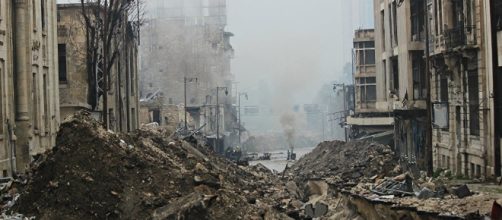After the massacre of Aleppo, US, EU, Russia, Syria are charged from the public international opinion with having torn the country apart (or with having not avoided it). In the past few days Iranian DM congratulates Syria on the liberation of Aleppo from terrorist.
The actual president of Syria, Bashar al-Assad, in an exclusive interview with Spanish news agency EFE, one year ago, was clear on his definition of 'terrorism.. "For us, in Syria, everyone who holds a machine gun is a terrorist, - he said - Without defining this term, reaching a definition, there is no point of a just meeting."
A distinction between the different parties was made instead by US President Barack Obama.
He pursued a policy of non-intervention in Syria (following a US script that determines intervention on the principle of national interest), but he allowed an air campaign against ISIL (the cost of which has increased by 24 % from June 2015 to July 2016).
Non-state actors
The definition of "terrorism" provided by the Study of Terrorism and Responses to Terrorism (Start), a research and education Center of the University of Maryland, is more accurate (the Center maintains also a GTD, Global Terrorism Database, considered to be the most comprehensive dataset on terrorist activity globally).
The terrorism could be classified - according to it - as "the threatened or actual use of illegal force and violence through fear, coercion or intimidation." More specifically, terrorist operations are "actions outside the context of legitimate warfare activities." It means acts led by non-state actors, contrary to international humanitarian law.
The rank of countries most impacted by terrorism
Then, the actions of governments do not get counted. Yet, the connection between State and terrorist is often weighty. 93 % of all terrorist attacks between 1989 and 2014 had taken place in countries with high levels of state-sponsored terror (i.e. political terror): extra-judicial deaths, torture, and imprisonment without trial. Over 90 % of all terrorism deaths occurred in countries engaged in violent conflicts. Only 0,5 % of terrorist attacks occurred in countries that did not suffer from conflict or political terror. The data are elaborated (on the basis of GTD) by the Global Terrorism Index 2016, provided by the Insitute for Economics and Peace (IEP), an independent, non-partisan, non-profit think tank (it analyses also the economic impact of terrorism).
In the last year, the terrorism increased in the countries engaged in armed conflicts. Syria, Yemen, and Afghanistan had risen to more than 800 deaths in 2015. Niger and Chad too had increases in death, because of the greater activity of Boko Haram. A rank of the countries most impacted by terrorism (based on these data) is not unexpected: 1) Iraq, 2) Afghanistan, 3) Nigeria, 4) Pakistan, 5) Syria, 6) Yemen, 7) India, 8) Somalia, 9)Egypt, 10) Lybia (Uk is 34th, the US are 36th).
Tactics of the terrorism
In this classification, it is counted the number of attacks, but also the number of deaths. They could vary widely due to "differing tactics of the terrorist groups and the message that they wish to to send," states the Report.
In India, terrorist attacks, for example, not caused many victims, mainly made by the groups to remind governments their presence, without provoking military reactions. It may signal the openness to negotiate future peace accords. Similarly, it happened in the Philippines.
Indeed, it's hard to analyse terrorism out of the country's situation. "Terrorism is statistically related to the acceptance of the rights of others, good relations with neighbours, the likelihood of violent demonstrations and political terror" asserts the report. The Syrian civil war couldn't be simplified as "terrorist groups" - as usually defined - against a government legitimately elected.

